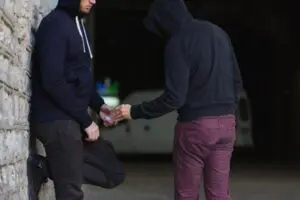What Do I Do If My Child is Dealing Drugs?

If you suspect your child of dealing drugs, you may have to take immediate action to protect them. Drug dealing is illegal in the United States, most individuals who sell drugs also use them, and your loved one is likely putting their health, future, and life opportunities at risk. While you can’t make choices for the people in your life, you can attempt to get them help before it’s too late.
However, it’s also important to keep in mind that you can’t likely force change. Your child choosing to deal drugs is a decision they made, and another decision has to be made by them to change that behavior. Even if they are a minor, you can only take limited steps to control their actions. Your best course of action is to talk with your child, be reasonable, and work to change the environment that supports dealing drugs.
Is My Child Dealing Drugs?
If you suspect your child is dealing drugs, you are likely concerned for good reason. However, you should consider verifying what they are doing before you come forward with an accusation or request for them. Common indicators that someone might be dealing drugs include:
- Sudden, unexplained cash or money
- Large quantities of drugs
- Unexplained and hidden phone/Internet usage
- Unexplained absences, especially if your child is lying about where they were or why
- Sudden new clothes, gadgets, or vehicles you did not purchase and/or they cannot afford
In most cases, it can be difficult to verify your child is dealing drugs without actually catching them in the act. You can attempt to do so, but it’s often a good idea to just sit down and talk.
In some cases, you may want to search your home, their room, and anywhere your child is likely to store or stash drugs. If you can find where they store drugs, cash, or purchases, you have proof of what they are doing, which can help you to move forward. It may also be essential should you choose to take your child’s drug-dealing to the police or another local authority.
Stop and Think
It’s never a good idea to rush into a potentially life-changing decision. Confronting your child about using or dealing drugs is a life-changing situation. It’s important to sit down, think about possible courses of action, what you will say, and how you will approach your child.
Your course of action should depend on factors such as whether or not your child is also using, how they respond to your talk, and what evidence you’ve found. For example, if you’ve caught your child with a large quantity of an illicit substance like heroin, your actions should be much stronger than if you suspect they’re selling a few grams of marijuana to pay for their own habit.
- What do you want to do? Why?
- What is the ideal result of your actions?
- What is the worst-case scenario of your actions?
- Can you create a long-term plan to support your child?
- Can you make changes in your own life to facilitate this change?
Making changes for your child can be difficult. However, it’s important to review your options so you have a good idea of next-steps and what to do after you talk to your child. Your plan should include options for every result of talking to your child.
Have a Talk

It’s important to talk to your child about their substance use and sale. It’s also important to do so in a calm, nonjudgmental, and rational way. Anything you say that is judgmental will likely only drive your child further away. Importantly, teens are often difficult to talk to or reason with. They may feel rebellious, like anything you say is not worth listening to, or like you’re getting in their way. This can be hurtful, but you should be prepared for it.
- Stay calm
- Don’t judge their actions, ask about it
- Discuss volume, usage, reasons, and whether or not your child is using themselves
- Ask if they want help
Chances are, your child won’t want to tell you anything. You can simply tell them you’re there for them when they’re ready to talk and go from there.
Setting Rules
Try to stablish ground rules for your home. For example, you probably want to establish a zero drug and zero drug sales policy for your home. Here, it’s important to establish that these rules are intended to protect your child and to protect others. Sharing information about the penalties for drug-sales in your state, abuse and overdose statistics for what they are selling, and that you want them to be safe is usually the best approach. Why? If you say something that sounds accusatory, talk about “what people will think”, or are largely concerned about your child’s prospects such as at school or something they’ve worked for, you’ll likely lose their interest. You may also convince them you don’t really care about them, just what they can do.
Importantly, if you create ground rules, you have to follow up on them. If you list consequences and don’t follow up, your child will not respect your rules. At the same time, it’s usually a good idea to avoid tough love, which can push teens away and can do more harm than good. Instead, you want to create strong rules like “If I find out you are selling drugs, I will report it”, or “If you don’t move into rehab, I will discuss options with your teachers and doctor”. Don’t set consequences you have no way of enforcing like “I will take away your phone” (because if they’re selling drugs, they obviously have money to replace it), or “you’re grounded”.
Getting Help
Depending on your child’s age, you might be able to either invite them to professional help or force them into it. In either case, it’s better to attempt to get their permission and support before doing so. However, you can force your child to go to professional therapy, can move them into rehab, and can move them into drug-free schools to prevent or minimize the risk of future problems.

Here, your actions should heavily depend on what your child is doing, how they respond to your talks, and what they are selling. Some of your options include:
- Discussing options with local police. They may respond by arresting your child
- Discussing options with your local neighborhood watch
- Calling a rehab clinic and setting up an appointment
- Enrolling your child in a Sober high school
- Contacting a psychologist or psychiatrist for assistance
- Contact your school counselor
It’s never easy to admit that your child is selling drugs. It’s even harder to talk to them about it, make room for change, and to carry out that change. Doing so requires collaboration from both sides, and it will be a long process. This is especially true if your child is also using drugs, which means they will likely need intensive rehab and long-term therapy. However, getting your child help is important. If they’re dealing drugs, they are harming themselves, their future, and the lives of everyone who purchases drugs from them. Taking action to stop the problem before it results in their arrest, hospitalization, or other long-term consequences is a matter of harm-reduction.
If you love your child, you want to get them help. Hopefully you can move them into rehab and support, to help them get their life back.

